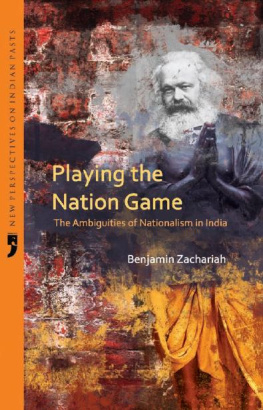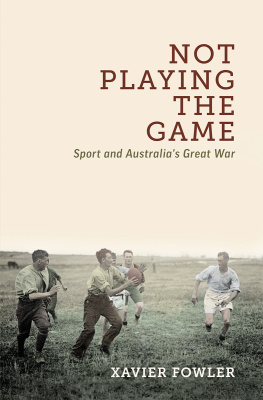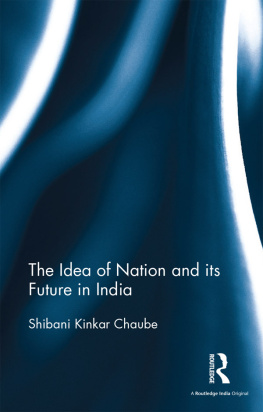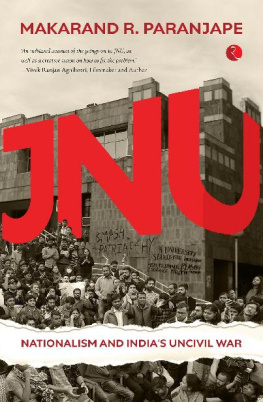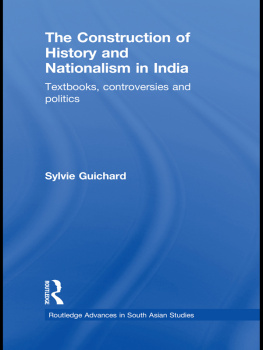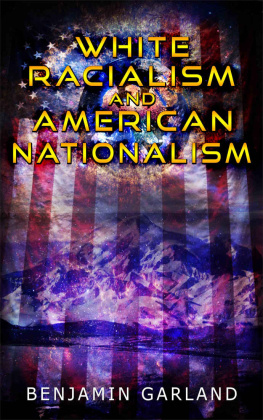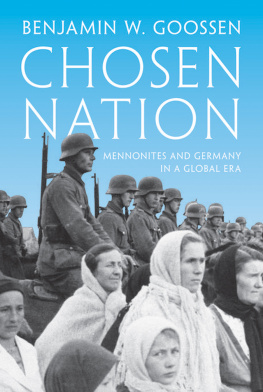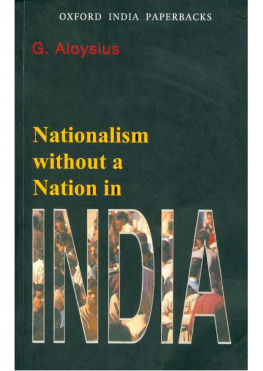Playing the Nation Game
YODA PRESS
79, Gulmohar Enclave New Delhi 110 049 www.yodapress.co.in
Benjamin Zachariah 2011
First published by YODA PRESS 2011 Second impression 2016
The moral rights of the author have been asserted Database right YODA PRESS (maker)
All rights reserved. Enquiries concerning reproduction outside the scope of the above should be sent to YODA PRESS at the address above.
ISBN 978-81-906186-4-9
Editor in-charge: Nishtha Vadehra Typeset in Balaram 11/14
By Jojy Philip, New Delhi 110015
Printed at Saurabh Printers Pvt. Ltd. Published by Arpita Das for YODA PRESS
Contents
Preface to the Second Impression: Second Thoughts vii on the Public Life of a Book
Preface to the First Impression: Why We Shouldnt Need This Book x v
Introduction: Nationalism as Legitimation 1 1 The Historiography of Nationalism and the 31 Nationalism of Historiography
2 Recasting the (Meta)Narrative: The Indian 79 Nationalist Movement
3 Hurreebabu and the Royal Society: 117 Bengali Narratives of Their Past and the Colonisers Ubiquitous Presence
4 The Invention of Hinduism for National Use 153 5 The Nehruvian Nation and the Developmental 205 Imagination
Conclusions: On Invented Wheels, Modifications 255 and Improvements
Bibliography 266 Index 296
Preface to the Second Impression
Second Thoughts on the Public Life of a Book
H
ostages to fortune are often left behind in unexpected places; and fortune catches up and holds you to account. When I finished this book in 2011, it seemed self-evident to me, and to anyone with whom I shared spaces or conversations, academically or socially, in public or in private, that the age of plausible national argument was over in India. Can we now talk about something else?, Why We Shouldnt Need This Book, and other lines of self-conscious self-deprecation marked its pages, signalling, I thought, the moment when (as in all situations in which you appear to have won the argument) everyone agrees with you, and you in turn generously agree that they agreed with you all along all you were doing was to complete, and make consistent, what others had begun long ago.
This assumption that our side was winning the argument was based on talking mostly to people who were already on our side: critical intellectuals, scholars, and activists who were gradually coming to the conclusion that a reliance on being on the side of a good, inclusive nationalism was nonetheless to be complicit
viii PREFACE TO THE SECOND IMPRESSION
in some form of nationalist exclusion and potentially statist violence. But even then, such optimism was misplaced. Now, as more and more shrill and aggressive forms of nationalism, or claims to custodianship of the national, dominate the public domain, everything must be judged by its conformity to some pre-defined national values, the epithet anti-national is thrown about a lot, and many on our side wish to return to the safety of the right side of nationalism, even if they know it to be an empty signifier, or a normative category without descriptive capacity. The connections and complicity of scholarship and politics can be opened up to scrutiny here. Books are banned or sought to be banned invoking the need not to offend national sentiment, the national in each case being inflected slightly differently, regionally or otherwise. Shivaji could not be subject to criticism as a historical figure; Gandhi cannot have been a homosexual (although there is apparently no discomfort at his having been a racist); the right to rape your wife is apparently sacrosanct in a country allegedly not ready as a whole for a marital rape law. The list could be extended or supplemented with the invocation of the need not to offend local, identitarian, religious or caste (and all mostly male) sentiment all of which make special
On the banning by the Maharashtra government of and controversy surrounding the book by James Laine, Shivaji: Hindu King in Islamic (Delhi: Oxford University Press, 2003), see Christian Lee Novetzke, The Laine Controversy and the Study of Hinduism, International Journal of Hindu Studies 8, 13 (2004), pp. 183201.
Joseph Lelyveld, Great Soul: Mahatma Gandhi and his Struggle with India (New York: Knopf, 2011), made international news: see Time magazines report at http://world.time.com/2011/04/01/gandhi-lelyveld-and-the-greatindian-tamasha/ and the New York Times report at http://www.nytimes. com/2011/04/01/books/gandhi-biography-by-joseph-lelyveld-roils-india.html#, both last accessed on 07-07-2016.
http://www.independent.co.uk/news/world/asia/marital-rape-cannotbe-applied-in-the-indian-context-says-indian-minister-a6927406.html last accessed on 07-07-2016.
claims to inclusion in a national narrative, in which one or other form of culture or indigenous behaviour pattern is invoked. The continuum of conservatism in community-family-culture-nation formations is in the ascendant.
This was clearly already happening in and before 2011, but the momentum of politics seemed to have been away from and not towards that continuum. This has now changed. Intellectuals, some of whom had stopped me at university canteens or conference-venue corridors across the world to tell me that they already had long accepted the arguments I had made in the book (implying that it wasnt an original argument an implication which I of course agreed with), now reacted differently: national sentiment should be respected, and not offended; and text-books were to be amended accordingly to assuage the collective anger of a group demeaned or marginalised in the national narrative always the national narrative. A publishers contract that I refused to sign required me to indemnify the publishers against charges of libel, sedition and anti-national arguments (the three grouped together): the banning of Wendy Donigers book on Hinduism and the activities of a self-proclaimed national and Hindu cultural warrior, Dinanath Batra, was the reason given to me as to why this was a necessary clause in a publishers contract.
Amidst this backlash, I must admit to being a little puzzled about the fate of this little book: it is about to go to a second edition, which means there are a good many people who actually bought it. They didnt necessarily read it, of course, and I can well imagine dusty bookshelves upon which my text shares dust with worthier volumes: did they buy it for its cover, a personification of Indian nationalism with a Gandhi-ish body, a saffron loincloth,
On Wendy Doniger, The Hindus: An Alternative History (New York: Viking Penguin, 2009), its Indian edition, and on Dinanath Batra, see for instance http://www.dailyo.in/arts/wendy-doniger-the-hindus-thealternative-history-penguin-india-banned-speaking-tiger-hinduismdinanath-batra/story/1/7754.html last accessed on 07-07-2016.
x PREFACE TO THE SECOND IMPRESSION
and the head of Karl Marx? Academic writing is a strange practice, in which you send a book out into the world with no idea whether it will have a readership at all an intellectual version of the message-in-a-bottle trick. There have been some reviews, mostly positive; and some of them in the mainstream media rather than in academic journals that remain obscure to a wider public. This wasnt of course meant to be a purely academic book: some activists have praised it; some academics admit to having read it. But for the most part, at least as far as I can judge, it has as yet failed to have an impact: the historiography of India proceeds in nationalist goose-step, non-Indian historians of India are cautious not to offend Indian nationalist sentiment, and many writers exercise rigorous self-censorship lest they fall foul of either law or vigilante group that can invoke the force of national sentiment against them.



